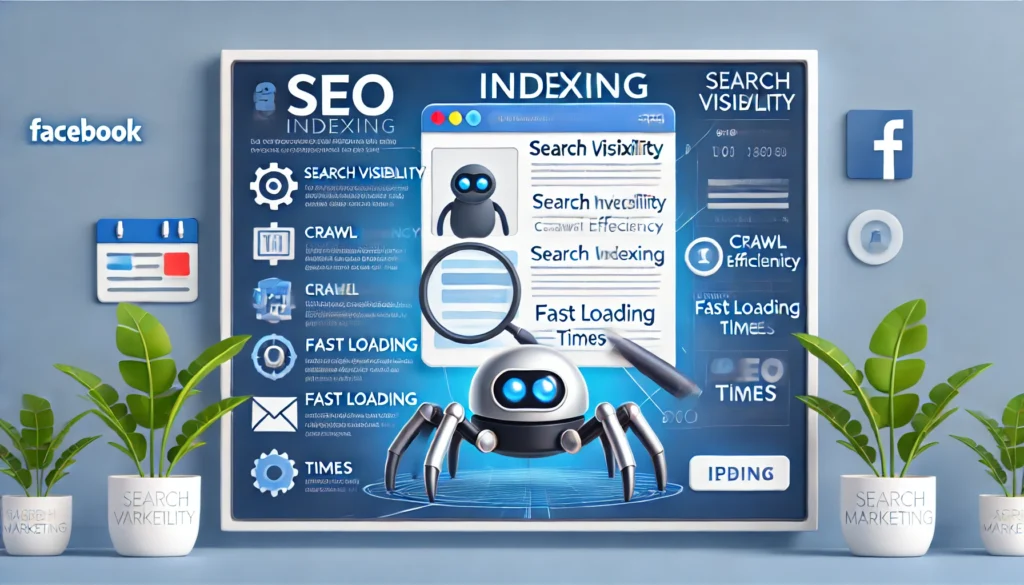
When it comes to SEO, one essential step that often goes unnoticed is indexing. You could have a fantastic website filled with valuable content, but if it isn’t indexed by search engines, it’s as if it doesn’t exist. In this blog post, we’ll explore what indexing means, why it’s critical for SEO success, and actionable tips to help get your pages indexed faster.
What is Indexing in SEO?
In simple terms, indexing is the process by which search engines add your website’s content to their database, making it possible for your pages to appear in search results. Once your site is crawled by a search engine (like Google), it decides whether or not to index each page. Only indexed pages are shown in search results, which is why indexing is essential for your site’s visibility online.
Why is Indexing Important for SEO?
If your pages aren’t indexed, they won’t appear in search engine results pages (SERPs), meaning users won’t find your content when they search. Let’s look at some specific reasons why indexing is key for SEO:
- Increased Search Visibility: The more pages of your site that are indexed, the more opportunities you have to appear in search results. Each indexed page is a chance to capture relevant search traffic.
- Higher Crawl Efficiency: Proper indexing helps search engines understand the structure of your website and efficiently crawl it, ensuring they capture all relevant pages.
- Authority Building: Indexed content helps you build credibility in your industry. The more high-quality pages that are indexed, the more likely users and search engines are to see you as an authority in your field.
- Improved Ranking Potential: Pages that are indexed and follow SEO best practices are more likely to rank higher in search results, driving more organic traffic over time.
Factors That Influence Indexing
Indexing isn’t an automatic process, and several factors impact whether or not your pages will be indexed:
- Page Quality: Pages that contain valuable, unique, and high-quality content are more likely to be indexed.
- Crawlability: If search engines can’t access or navigate your pages easily, they won’t be able to index them. Technical issues, like broken links or slow page speeds, can negatively affect crawlability.
- Website Structure: A clear, well-organized website structure helps search engines understand how pages are connected, which improves indexing efficiency.
- Robots.txt and Meta Tags: Instructions in your robots.txt file or meta tags can block search engines from indexing certain pages, so ensure critical content isn’t accidentally excluded.
How to Get Your Pages Indexed Faster
If you’re launching new content or updating existing pages, here are some strategies to encourage faster indexing:
1. Submit a Sitemap to Google Search Console
A sitemap is a roadmap of your website, helping search engines find and understand your pages. Submitting your sitemap to Google Search Console is a quick way to signal that your content is ready to be crawled. This is particularly helpful for larger sites, as it enables more efficient crawling and indexing.
2. Use the URL Inspection Tool
In Google Search Console, the URL Inspection Tool allows you to request indexing for specific pages. This is useful if you’ve recently published a high-priority page or updated content and want it indexed quickly. It’s a straightforward way to speed up the process and ensure that essential pages don’t go unnoticed.
3. Improve Internal Linking
Internal links create pathways within your site that help search engines navigate and find your content more easily. When a well-linked page is crawled, search engines are more likely to discover connected pages. For example, linking to new content from your homepage or popular pages increases its chances of being crawled and indexed faster.
4. Ensure Fast Loading Times
Page speed impacts both user experience and how search engines crawl your site. If your pages load too slowly, search engines may abandon the crawl, resulting in incomplete indexing. Use tools like Google’s PageSpeed Insights to identify and fix any speed issues, making your pages more accessible to crawlers.
5. Leverage Social Media and Backlinks
Sharing new content on social media platforms can encourage indexing because search engines often use social signals as indicators of content quality. Additionally, earning backlinks from reputable sites is a powerful way to drive crawlers to your pages. When other indexed sites link to your content, search engines are more likely to follow those links and index your pages.
Troubleshooting: Why Your Pages May Not Be Indexed
If you’ve tried the above strategies but still face indexing issues, there could be underlying problems:
- Duplicate Content: Duplicate or very similar content can confuse search engines, causing them to ignore pages. Use unique content and specify canonical tags for similar pages to avoid this.
- Blocked Pages: Check your robots.txt file and meta tags to ensure essential pages aren’t blocked.
- Crawl Budget Limitations: Large sites may exceed their “crawl budget,” or the number of pages Google allocates to crawl per session. Prioritize important content in your sitemap to help manage the budget.
Final Thoughts: Prioritizing Indexing for SEO Success
Indexing is a vital part of your SEO strategy, directly affecting your website’s visibility, search engine rankings, and authority. By making sure your site is easy to crawl, using Google Search Console, and leveraging internal links, you can help search engines discover and index your pages faster. A proactive approach to indexing is key to ensuring that your content reaches its audience and has a strong impact on your site’s SEO performance.
Make indexing a priority in your SEO plan, and watch your website’s visibility soar!
